6 Tips to Think About When Designing an L-Shaped Kitchen Layout
The kitchen is the heart of most homes. It’s used for much more than just preparing meals. It’s where the family gathers to catch up, guests congregate to chat, and our kids sometimes do their homework. It’s absolutely essential to create a flexible, comfortable, and efficient environment for the multi-purpose uses of the kitchen.
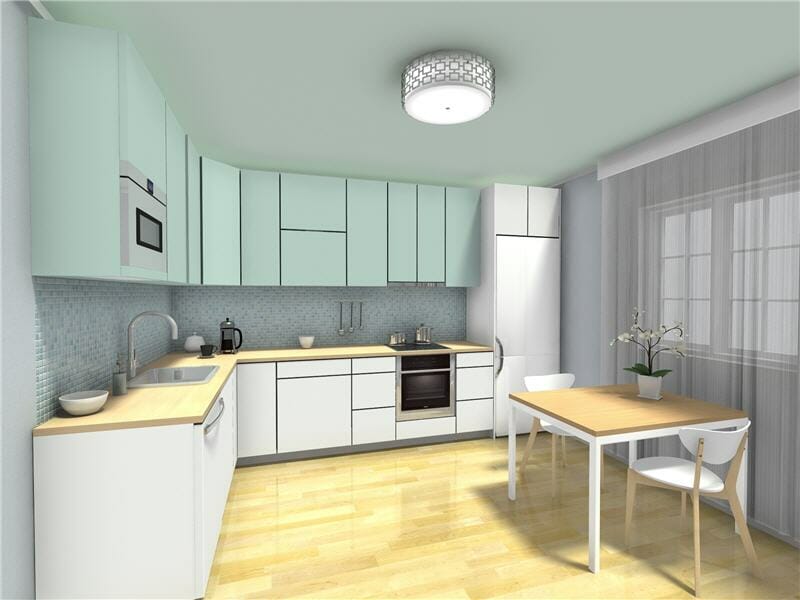
There are many good reasons why the L-shaped kitchen layout is the most popular kitchen design. The L-shaped layout works in kitchens of all shapes and sizes and is one of the most ergonomic designs for an efficient workflow.
Cooks love this basic layout, as it reduces the walking time between the refrigerator, stove, and sink –the focal points of every kitchen.
We have put together 6 tips to help you create the perfect L-shaped kitchen layout. But first, let’s talk about what an L-shaped layout is.
What Is an L-Shaped Kitchen Layout?
Just like the name sounds, an L-shaped kitchen layout is defined by two perpendicular walls — one longer and one shorter that meet to form an L.
Typically along the longer wall, you have most of your counter space and cupboards. Along the shorter wall, you will have less counter space with one appliance — often the stove. Here’s a typical L-shaped kitchen floor plan for a small space to give you a better idea:
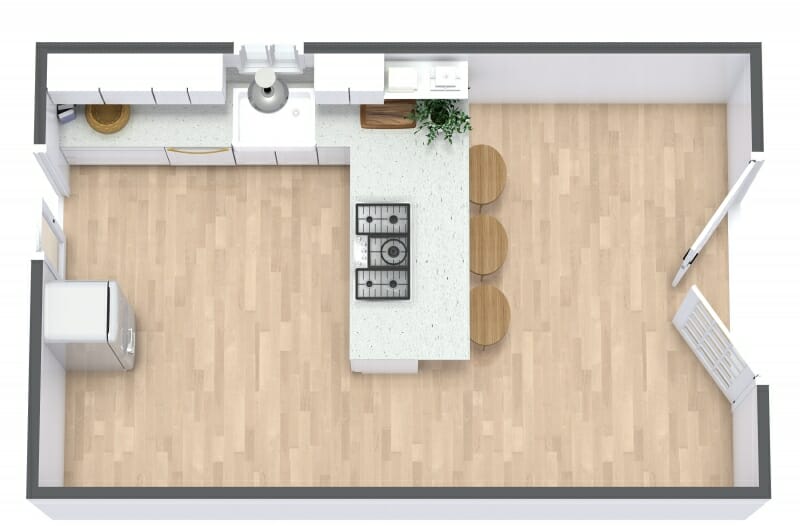
Many L-shaped kitchen layouts also include an island to provide more countertop space, sometimes a sitting area with bar stools, and additional storage.
Why Use an L-Shaped Kitchen Layout?
There are several good reasons to opt for an L-shaped design:
- Efficient Workflow - An L-shape layout provides you with a natural and ergonomic way to separate kitchen tasks. One leg can be dedicated to food preparation and cooking, while the other leg is reserved for clean-up.
- Maximize Room Space - By fitting perfectly into a corner, an L-shape design maximizes space and is perfect for small areas. Often a small kitchen is enclosed by four walls, two of which may have doors and windows.
- Great for Open Plans - L-shaped kitchens are ideal for home layouts that combine kitchen, living, and dining spaces. They also work well in small studio apartments.
- Flexible - No matter what your room dimensions are, the L-shape plan provides plenty of flexibility.
What to Think About When Designing an L-Shaped Kitchen Layout
Here are our top tips for designing an L-shaped kitchen:
- Remember the kitchen work triangle
- Balance appliances with countertop space
- Consider the alternatives
- You can never have too much storage
- Think about adding an island
- Take into account doorways and windows
1. Remember the Kitchen Work Triangle
The kitchen work triangle (also known as the kitchen triangle or the golden triangle) is a simple concept that states the fridge, stove, and sink should form a triangle within your kitchen layout.
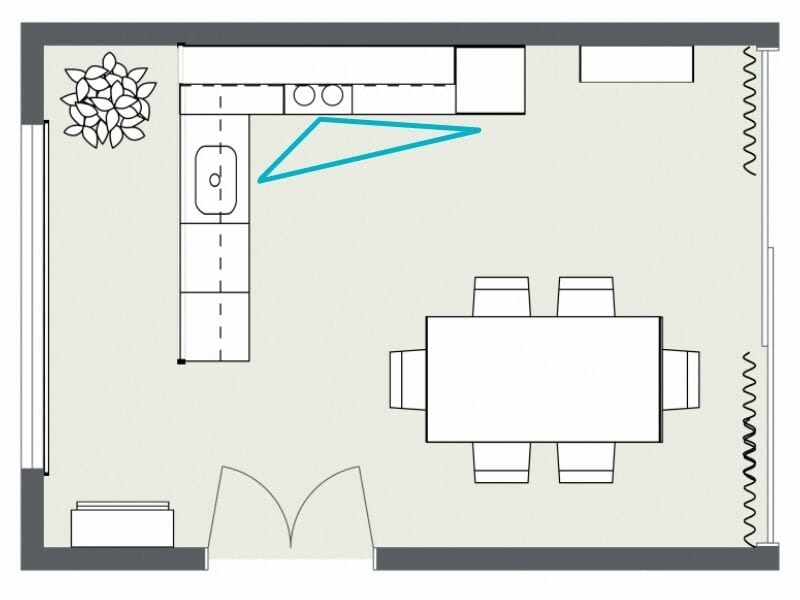
The idea is to create an ergonomically efficient working environment and reduce the walking distance between stations.
Each side of the triangle should be between four and nine feet apart for optimal efficiency. Too big and you’ll have further to walk, too small and you’ll create a congested or cramped workspace.
2. Balance Appliances With Countertop Space
Once you’ve added your main kitchen appliances like your fridge, stove, and sink, you’ll need to consider how many additional appliances to include. The list is almost endless, from dishwashers and small under-counter beverage fridges to smaller items like toasters, microwaves, and coffee machines.
Keep in mind small appliances that don’t go under the counter take away much-needed countertop space from your kitchen. This is especially important if you’re working with a small L-shape design.
Top RoomSketcher Tip
Use the 3x4 rule to calculate countertop space. This rule states that a kitchen needs three separate countertops that should each be approximately four feet long.
The 3x4 rule is related to the kitchen work triangle idea. As there are three stages to creating a meal (food prep, cooking, and cleaning) you should reserve three countertop areas for each stage. Preferably each countertop area should be close to your three main appliances, the fridge, stove, and sink.
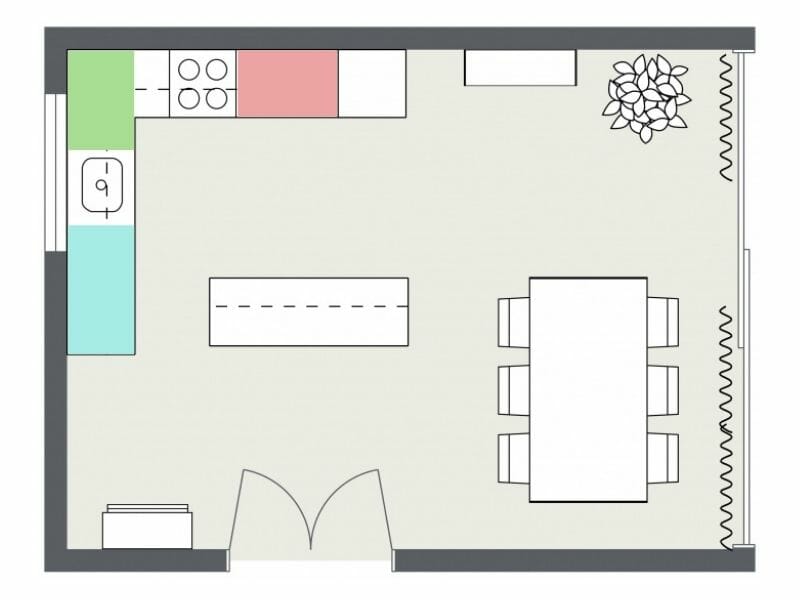
3. Consider the Alternatives
Before you dive right in and commit to the L-shape, it’s worth considering some of the alternative kitchen layouts. Common plans include galley, single-wall, U-shape, and G-shape.
Each has its own advantages and disadvantages. Your room shape, room size, and budget will be the main factors when choosing which layout you will use.
To make life easier, why not plan your kitchen design first using the RoomSketcher App? You can quickly compare each option, see how they work with your specific requirements and room dimensions. RoomSketcher allows you to easily create 2D plans, or even visualize your new kitchen in stunning 3D.
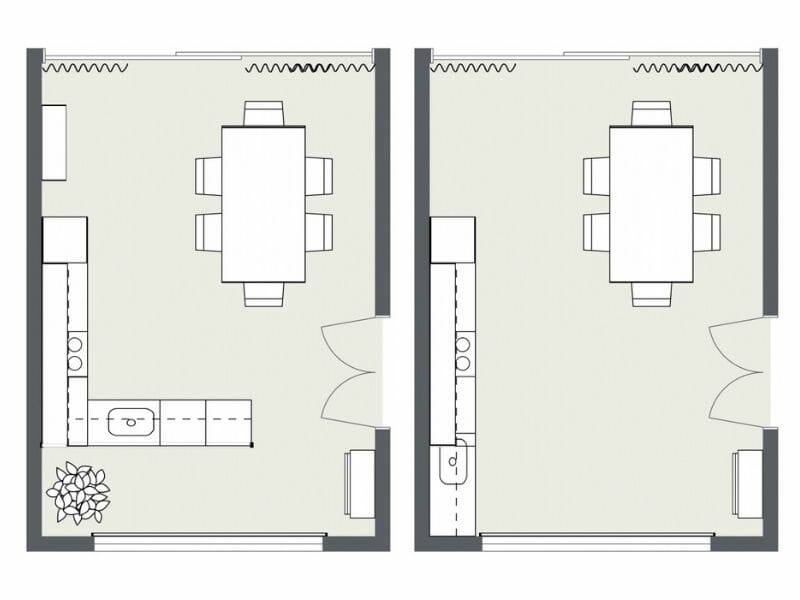
4. You Can Never Have Too Much Storage
By design, an L-shaped layout limits you to only two rows of upper and lower cabinets. Compared to U-shaped or G-shaped designs, this can lead to limited storage options. Especially in small rooms.
A clever solution in an L-shaped plan is to go vertical and stack an additional row of cabinets above. This works well if your room has high ceilings.
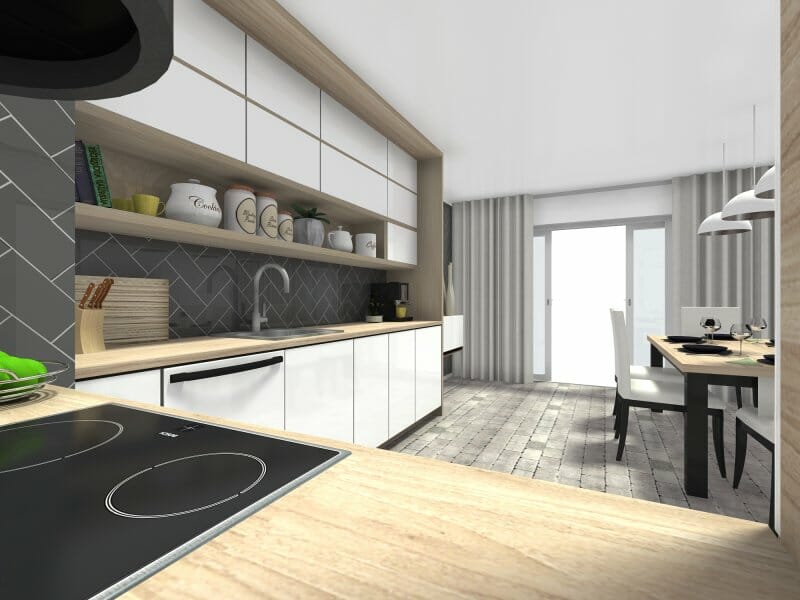
Top RoomSketcher Tip
Another great way to maximize storage capacity is to make the most of corners. Use carousel units to ensure no space is wasted.
5. Think About Adding an Island
Adding an island to a traditional L-shaped kitchen layout gives you the best of both worlds. You retain the openness and efficiency of the design while also adding extra countertop space, possibly seating, and definitely storage.
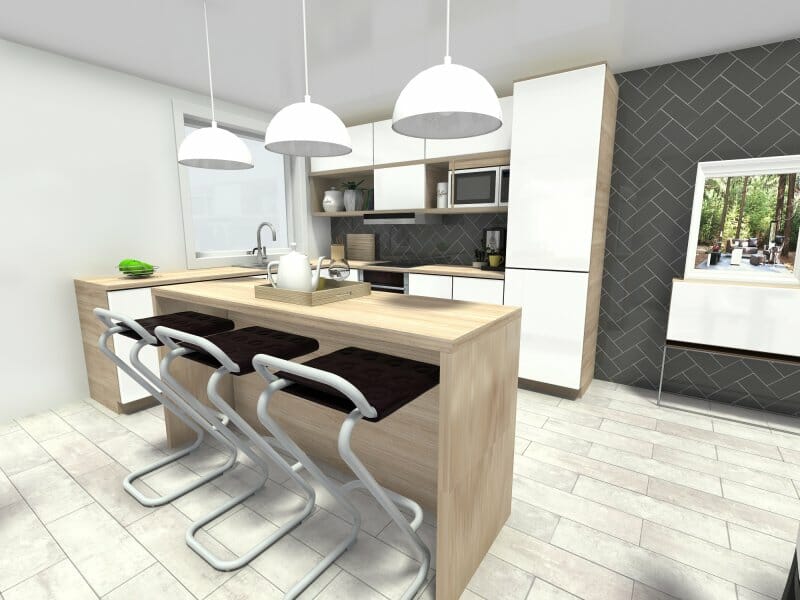
You can also add a large butcher block top to your island to create a great food prep area in your kitchen. However, try not to compromise the efficiency of your kitchen by obstructing the work triangle.
6. Take Into Account Doorways and Windows
If your room has a doorway or large window in the corner, you can still make use of an L-shaped design. Commonly referred to as a broken L-shaped layout, this alternative still provides all the benefits and efficiency of a standard L-shape:
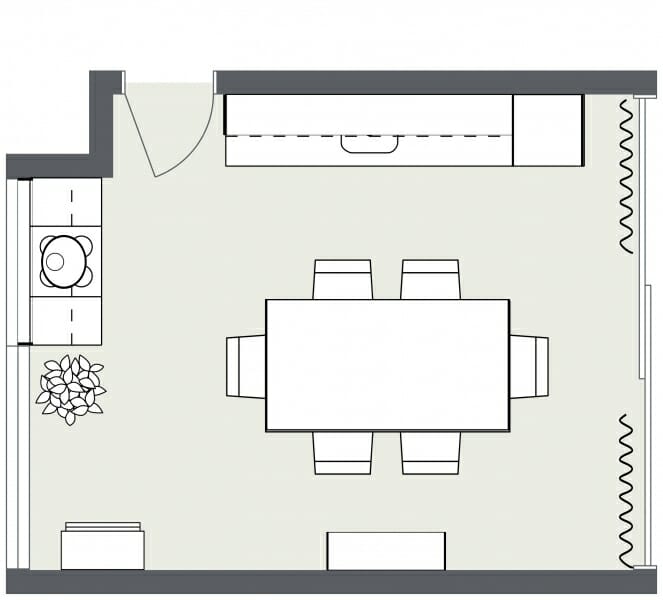
You may experience more through traffic, so consider placing your primary appliances and workstations away from the doorway to avoid congestion.
Design Your Perfect L-Shaped Kitchen
We hope we have inspired you to create the perfect L-shaped kitchen — an inviting and efficient place to cook, entertain and just hang out.
Enjoy designing your new kitchen or upgrading your existing one. Remember, you can use the RoomSketcher App to speed up the process and quickly compare all the options.
Don't forget to share this post!
Recommended Reads
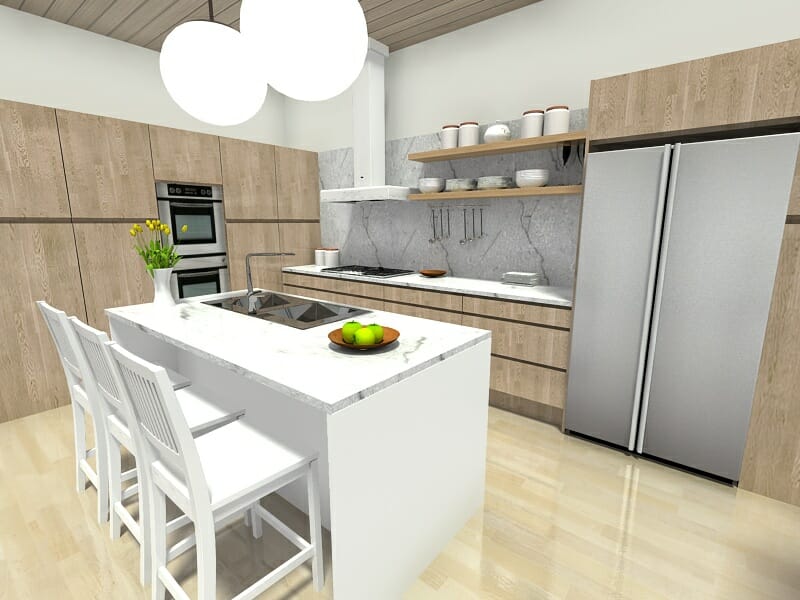
7 Kitchen Layout Ideas That Work
Planning a kitchen? These 7 essential kitchen layout ideas will make your new kitchen design a success.
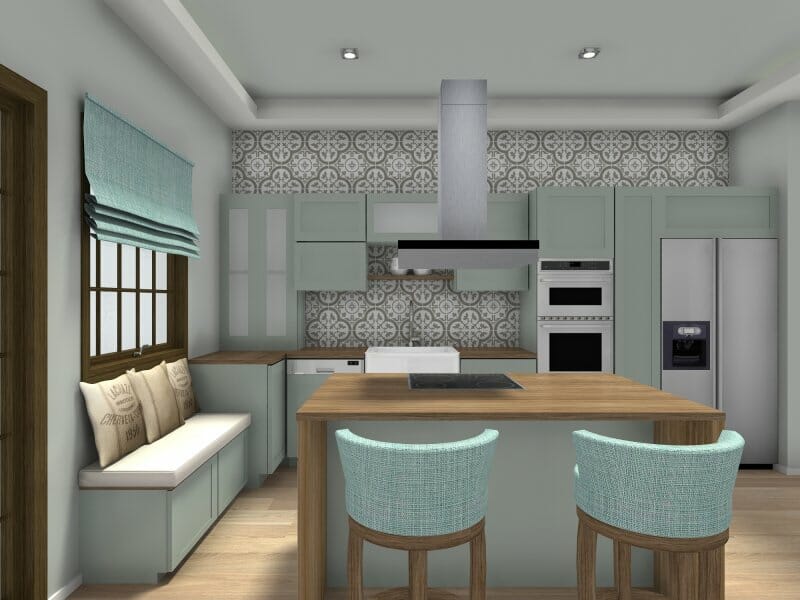
Plan Your Kitchen With RoomSketcher
Need help planning a kitchen design? RoomSketcher shows you how to plan your kitchen with an online kitchen planner.
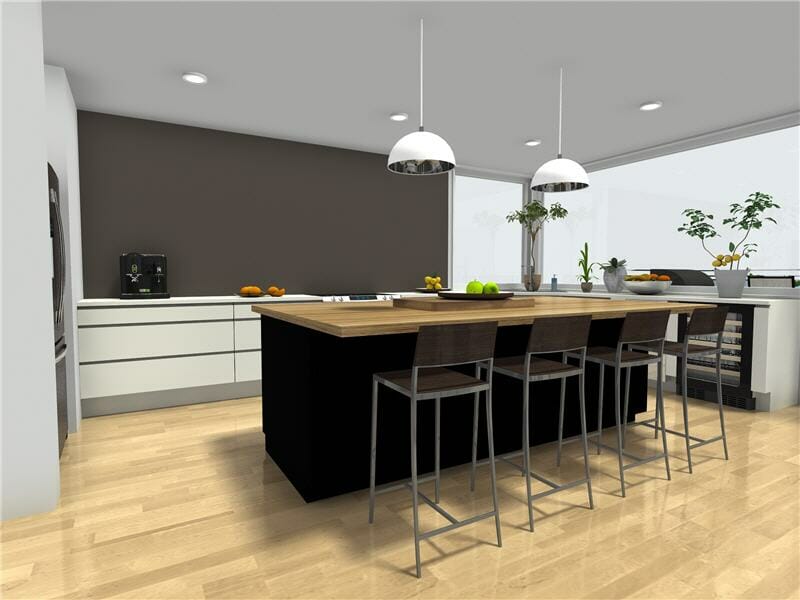
4 Expert Kitchen Design Tips
Think like a kitchen designer with these 4 expert kitchen design tips.
